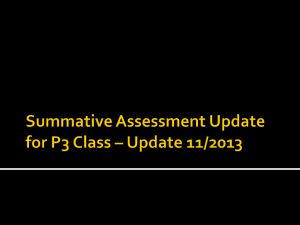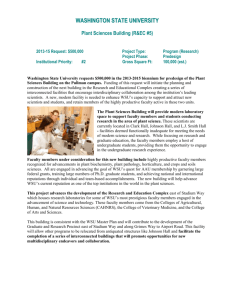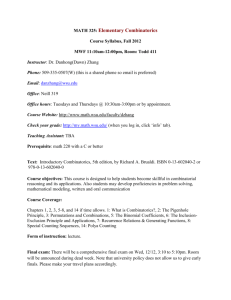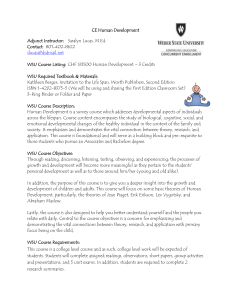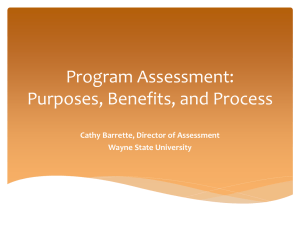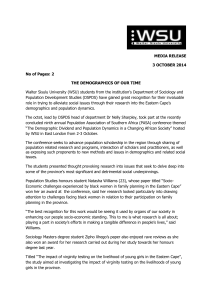Course Syllabus & Schedule
advertisement
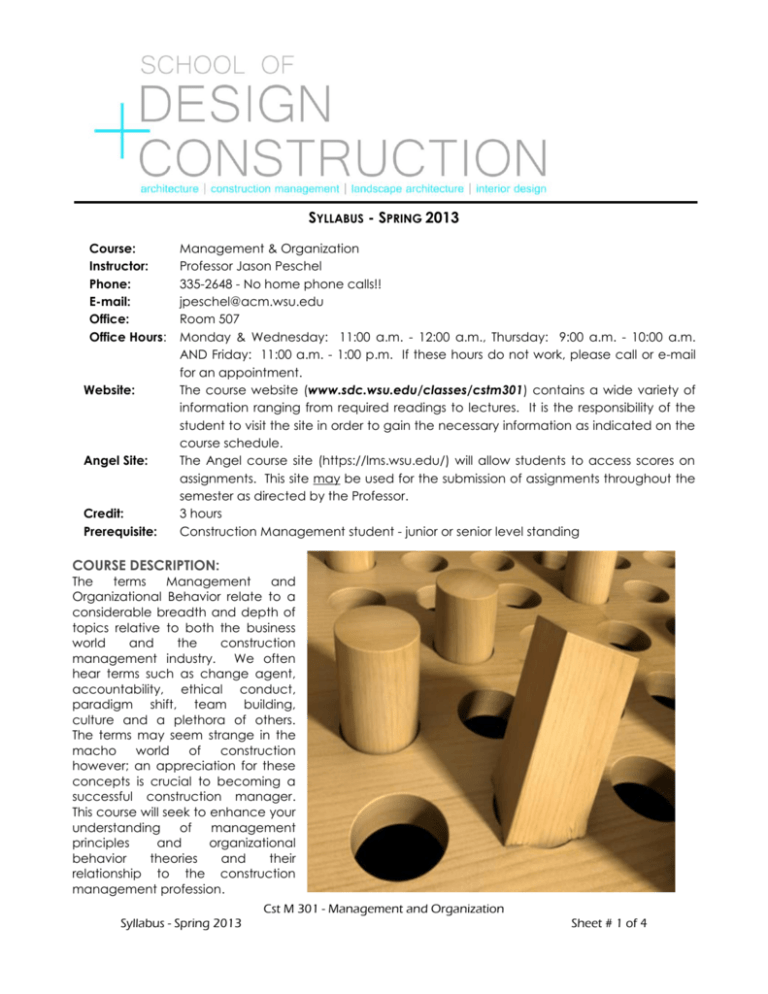
SYLLABUS - SPRING 2013 Course: Instructor: Phone: E-mail: Office: Office Hours: Website: Angel Site: Credit: Prerequisite: Management & Organization Professor Jason Peschel 335-2648 - No home phone calls!! jpeschel@acm.wsu.edu Room 507 Monday & Wednesday: 11:00 a.m. - 12:00 a.m., Thursday: 9:00 a.m. - 10:00 a.m. AND Friday: 11:00 a.m. - 1:00 p.m. If these hours do not work, please call or e-mail for an appointment. The course website (www.sdc.wsu.edu/classes/cstm301) contains a wide variety of information ranging from required readings to lectures. It is the responsibility of the student to visit the site in order to gain the necessary information as indicated on the course schedule. The Angel course site (https://lms.wsu.edu/) will allow students to access scores on assignments. This site may be used for the submission of assignments throughout the semester as directed by the Professor. 3 hours Construction Management student - junior or senior level standing COURSE DESCRIPTION: The terms Management and Organizational Behavior relate to a considerable breadth and depth of topics relative to both the business world and the construction management industry. We often hear terms such as change agent, accountability, ethical conduct, paradigm shift, team building, culture and a plethora of others. The terms may seem strange in the macho world of construction however; an appreciation for these concepts is crucial to becoming a successful construction manager. This course will seek to enhance your understanding of management principles and organizational behavior theories and their relationship to the construction management profession. Cst M 301 - Management and Organization Syllabus - Spring 2013 Sheet # 1 of 4 GOALS & OBJECTIVES: Upon completion of this course, students shall be able to: a. Understand and exhibit knowledge skills associated with management and organizational behavior principles such as the following: a. Ethics and conduct b. Business culture c. Business hierarchy d. Management and managing e. Decision making f. Accountability & individual behavior g. Team building and collaboration h. Conflict resolution b. Explore various management and organizational behavior principles and relate them to aspects and/or situations common to the construction industry. TEXTBOOK(S): - Management, John R. Schermerhorn, Jr., ISBN # 978-0470955680, CUSTOM PUBLICATION NOTE: This is the same text used for Mgmt 301 - QBQ! The Question Behind the Question, John G. Miller, ISBN # 0-9665832-9-9 REFERENCES: - Handouts, Class Notes & PowerPoint Slides - Guest speakers GRADING: % of Total Points 90.0% and above 86.0% to 90.9 80.0% to 85.9% 76.0% to 80.9% 70.0% to 75.9% 66.0% to 69.9% 62.0% to 65.9% Below 62.0% EVALUATION: A B+ B C+ C D+ D F Exams Homework Quizzes Participation Total: 50% 25% 20% 5% 100% OUTSIDE STUDY EXPECTATIONS: Students are expected to spend between 2 and 3 hours studying for each contact hour (i.e., classroom time). The lecture portion of this course meets 3 times per week for an hour each time resulting in 3 contact hours; as such, you should expect to spend between 6 and 9 hours “studying” outside of class. Studying includes efforts towards reading assignments, homework and preparing for exams. These expectations are consistent with university policy. SUBMISSION OF HOMEWORK ASSIGNMENTS: All homework shall be submitted no later than five (5) minutes after the official start of the class period on the date indicated on the written assignment sheet or provided via verbal instructions. Official start time is designated on the WSU Schedule of Classes website. If an assignment is late, 50% of the grade for that assignment will be deducted. If the assignment is turned in to the main office within 24 hours of the due date and time, a maximum of 50% credit may be awarded. After that time, the assignment will not be accepted for any reason. Either submit the assignment to the Professor or your respective TA (if applicable). In the event that is not feasible, submit the assignment to the office secretary who will affix the time and date on any late homework. No work is to be placed under my office door or in my mailbox. If this is done no credit will be received. Additionally, all assignments (group and/or individual) shall be accompanied by a properly executed Letter of Transmittal. A properly executed Letter of Transmittal means that it includes, but is not limited to, correct student contact information, a “wet ink” signature and a proper description of the item(s) Cst M 301 - Management and Organization Syllabus - Spring 2013 Sheet # 2 of 4 being transmitted. Failure to use a Letter of Transmittal and/or document submissions will result in an automatic deduction of 10% of the overall assignment score prior to the grading of the assignment. NOTE: All in-class assignments, exams, quizzes AND/OR homework assignments requiring submission via e-mail are exempt from the requirement for using a Letter of Transmittal. HOMEWORK: Homework shall consist of individual assignments performed outside of class time. These assignments will correlate to the topics discussed and are designed improve your base knowledge relative to management and organizational behavior. The number of assignments assigned will be determined by the level of classroom participation. Unless noted otherwise, all homework will be due at the beginning of the class period. QUIZZES: Each quiz will cover information that I feel needs to be emphasized. Normally they are not more than 10 minutes in duration and given at the start of the class period. Students are expected to have read the required readings and/or understand the material presented in class. I do not drop any quizzes. Be prepared and don’t skip class, because there is no make up. EXAMS: The periodic exams throughout the semester will not be cumulative in nature; however the final exam will be designed to assess your knowledge of the course content on a cumulative basis. The material covered in the exams will pertain to topics covered in class and/or assigned readings. As per the course schedule, there will be three exams during the semester and a final exam. Unless provided as a take-home exam, the final exam for this course will be at the specified date and time in accordance with university protocol. ATTENDANCE: Punctuality and class attendance are direct reflections of your interest in and commitment to the course and your education. If you enter the classroom after class has started, as determined by the professors watch, or you leave early you will be considered absent. No excuses will be entertained. However; if your absenteeism, tardiness or early departure becomes habitual (in excess of two) 3% of your grade will be deducted for each “absence”. In other words, you get two free absences from class (including the first day.) Because of these free days, no excuses for any reason will be entertained. If you are ill, see below. PARTICIPATION: Participation and preparation are also direct reflections of your interest in and commitment to the course and your education. Participation points shall be determined based upon the active engagement of the student as assessed at the discretion of the professor. Active engagement shall be defined as providing a meaningful contribution to the seminar content thereby requiring students to be prepared for class and willing to offer up opinions and/or comments relative to the applicable content. MAKE UP POLICY and ABSENCES: Quizzes, projects, homework, exams and attendance MAY NOT BE MADE UP. How to erase an absence from class: To erase the absence due to illness, personal crises, mandated court appearances, parental responsibilities and the like; you must provide a written explanation for your absence. While it is not required, a note from an “official” (i.e., doctor, attorney, etc.) will help to substantiate any absences and eliminate any abuses relative to the attendance policies set forth in this syllabus. If you have Army reserve duty, I must be informed in writing a minimum of two weeks before you will be absent. Approved university absences are excused only with permission prior to the day or days you are to be absent. Cst M 301 - Management and Organization Syllabus - Spring 2013 Sheet # 3 of 4 POLICY STATEMENTS: The School of Design and Construction at Washington State University is committed to providing our students with an exceptional educational experience. Our student population comes from diverse social, economic and ethnic backgrounds from throughout the United States and many foreign countries. As part of our commitment to our students we have established a series of school policies. As a student in the school you are required to read and abide by these policies. All school policies may be accessed through the school webpage at: www.sdc.wsu.edu. School policies are supplemental to other policies and procedures of the College and University. University policies are outlined in the University’s General Catalog. Students should become familiar with the General Catalog for the year in which they entered WSU as the General Catalog establishes University guidelines, policies and expectations for WSU students. This course, and all others in this school, conforms to the WSU School of Design and Construction Policy Statements referenced above. Again, please read them and understand them. In addition to these statements, there will be no hats in class, no food or drinks, (this does not includes water) and no tobacco products of any kind. Also, all cell phones MUST be turned off. Construction Management is a profession not a trade. Let us act like professionals in the highest regard. In meetings and in professional settings we do not chew tobacco and spit in cans, wear a hat, or place a donut on someone's desk. Anyone breaking these rules risks being removed from the course. Students with Disabilities: I am committed to providing assistance to help you be successful in this course. Reasonable accommodations are available for students with a documented disability. Please visit the Disability Resource Center (DRC) during the first two weeks of every semester to seek information or to qualify for accommodations. All accommodations MUST be approved through the DRC (Administration Annex Bldg, Room 205). Call 509.335.3417 to make an appointment with a disability counselor. Safety on Campus: The University has developed a resource in support of our commitment to the safety of students, faculty, staff and visitors. Students are encouraged to review the Campus Safety Plan, which can be found at http://safetyplan.wsu.edu and the University emergency website is http://oem.wsu.edu/emergencies to become familiar with the campus safety and emergency information provided. Additionally, students should also become familiar with the WSU ALERT site http://alert.wsu.edu where information about emergencies and other issues affecting WSU will be found. Finally, all students should go to the myWSU portal at http://my.wsu.edu and register their emergency contact information for the Crisis Communication System (CCS). Academic Integrity: I encourage you to work with classmates on assignments. However, each student must turn in original work. No copying will be accepted. Students who violate WSU’s Policy on Academic Integrity will receive an F as a final grade in this course. For further information regarding the policy, please visit http://www.conduct.wsu.edu/AI. FINAL EXAM: The final exam for this course which will occur during the regularly scheduled Final Exam time as set forth by the University. TOPICAL OUTLINE AND COURSE SCHEDULE: See next page(s) for further information/explanation. Cst M 301 - Management and Organization Syllabus - Spring 2013 Sheet # 4 of 4 Construction Management 301 - Management & Organization Course Schedule - Spring 2013 Week Date Discussion/Review Assignment/Exercise 1 1.7 Introduction & Requirements 1.9 Introduction to Management 1.11 Introduction to Management 2 1.14 Global Mngt. & Cultural Diversity 1.16 Ethics 1.18 Social Responsibility Readings Ch. 1 - Introducing Management - ia#1 Ch. 2 - Global Mngt. & Cultural Diversity Ch. 3 - Ethics & Social Responsibility - University Holiday - Martin Luther King, Jr. Day 3 1.23 1.25 Class Cancelled - BIM Training (Phoenix, Arizona) 4 1.28 Accountability 1.30 Information & Decision Making 2.1 Decision Making ia #2 5 2.4 2.6 2.8 6 2.11 Strategy & Strategic Management 2.13 Strategy & Strategic Management 2.15 Entrepreneurship & New Ventures 7 Unversity Holiday - President's Day 2.20 Organizational Structures & Design ia #3 Ch. 7 - Organizational Structures & Design 2.22 Organizational Structures & Design - 8 2.25 Mngt. Learning Past to Present 2.27 Mngt. Learning Past to Present 3.1 Drucker on Management 9 3.4 3.6 3.8 ga #1 QBQ! The Question Behind the Question Ch. 4 - Information & Decision Making - Exam #1 Class Cancelled - ASC Student Competition (Sparks, Nevada) Ch. 5 - Strategy & Strategic Management ga #2 Ch. 6 - Entrepreneurship & New Ventures Ch. 8 - Mngt. Learning Past to Present - Leading & Leadership Development Leading & Leadership Development Exam #2 ia #4 Ch. 9 - Leading & Leadership Development - Spring Break 10 3.18 Motivation Theory & Practice 3.20 Motivation Theory & Practice 3.22 Individual Behavior 11 3.25 Individual Behavior 3.27 Human Resource Management 3.29 12 4.1 4.3 4.5 ia #5 ia #8 Ch. 12 - Human Resource Management Class Cancelled - Symposium 2013 Human Resource Management Exam #3 Teams & Teamwork Ch. 13 - Teams & Teamwork 13 4.8 Teams & Teamwork 4.10 Teams & Teamwork 4.12 Communication & Collaboration 14 4.15 Communication & Collaboration 4.17 Conflict Resolution 4.19 Conflict Resolution 15 ia #6 Ch. 10 - Motivation Theory & Practice The One-Minute Manager Ch. 11 - Individual Behavior ga #3 ga #4 4.22 Control Processes & Systems 4.24 Control Processes & Systems 4.26 Lean Management Who Moved My Cheese? Ch. 15 - Control Processes & Systems - Final Examinations (4.29 - 5.3) key: ia = individual assignment Ch. 13 - Teams & Teamwork Ch. 14 - Communication & Collaboration ga = group assignment
